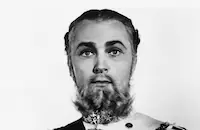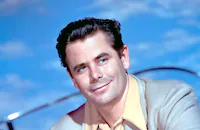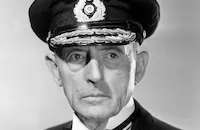The Lady in Question

Brief Synopsis
Cast & Crew
Charles Vidor
Brian Aherne
Rita Hayworth
Glenn Ford
Irene Rich
George Coulouris
Film Details
Technical Specs

Synopsis
Andre Morestan, the blustery, good-natured owner of a Parisian bicycle shop, is called to jury duty and becomes so moved by Natalie Roguin, the pathetic girl accused of murdering her lover, that he holds out for a verdict of not guilty. Once Natalie is acquitted, Andre offers her a job and takes her into his home on the pretext that she is the daughter of an old classmate. Complications arise when Andre's wife Michele becomes suspicious of his story and his son Pierre recognizes Natalie and suspects her of having an affair with his father. Soon, Natalie overcomes Pierre's misgivings, however, and the two fall in love. Trouble comes to the lovers in the form of Robert La Coste, the fiancé of Andre's daughter François, who discovers Natalie's true identity and begins to make advances towards her. To prevent more trouble, Natalie vows to leave the Morestan house and Pierre decides to rob his father's till so that he can run away with her. When Andre discovers the robbery, he accuses Natalie of being guilty all along and orders her from the house. Convinced by Henri Lurette, a fellow juror on the case, Andre goes to the President of the Court to argue for a miscarriage of justice when the judge informs him that new evidence has been found that proves Natalie's innocence. Andre then contritely returns home to welcome Natalie into his family.

Director

Charles Vidor
Cast

Brian Aherne

Rita Hayworth

Glenn Ford

Irene Rich

George Coulouris
Lloyd Corrigan

Evelyn Keyes

Edward Norris

Curt Bois

Frank Reicher
Sumner Getchell
Nicholas Bela
William Stack

Dorothy Burgess
Hamilton Macfadden
Leon Belasco
Julius Tannen
Philip Van Zandt
James B. Carson
Jack Rice
Earl Gunn
Harrison Greene

William Castle
Frank Hilliard
Carlton Griffin
Ronald Alexander
Alex Palasthy
Ted Lorch
Frank Pharr
Fred Rapport
Louis Adlon
Allen Marlow
Mary Bovard
Emma Tansey
Ralph Peters
George Davis
Jack Raymond
Vernon Dent
Eddie Laughton

Fern Emmett
Crew

Photo Collections
Videos
Movie Clip



Film Details
Technical Specs

Articles
The Lady In Question - The Lady in Question
The project was a pet of director Charles Vidor, who also guided the two stars through both Gilda and The Loves of Carmen. He was taken with French director Marc Allegret's Gribouille (1937) when it played domestically under its American release title Heart of Paris, and he lobbied Columbia boss Harry Cohn to procure the remake rights. The plot concerns an overbearing, middle-aged bicycle shop proprietor named Andre Morestan (Brian Aherne), who has grudgingly gone off to meet his civic obligations and report for jury duty. At least the case he's saddled with is provocative; the beautiful young Natalie Roguin (Hayworth) is accused of murdering the lover who put her up in an apartment.
Andre finds himself being moved by the young woman's plight, and less than convinced by the prosecution's case; he ultimately persuades his deadlocked peers to vote for her acquittal. After subsequently learning that the trial's notoriety has made Natalie unemployable, Andre offers her a position at the store and lodging within his home. Rather than share the uncomfortable truth of Natalie's circumstances with his wife Michele (Irene Rich), Andre introduces her as "Jean Renie," the daughter of an old school chum.
The pretext is seen through fairly quickly by Andre's son Pierre (Ford), who believes his dad is being exploited by this younger woman of questionable repute. It doesn't take long for Pierre to soften, however, as he finds himself falling for Natalie/Jean, and she begins to reciprocate. What future they have is threatened by Robert LaCoste (Edward Norris), the fiancé of Andre's daughter Francois (Evelyn Keyes). He, too, has uncovered Natalie's secret, and shows his true colors when he makes sexual advances upon her. Pierre and Natalie contrive a scheme to run away, and the disconsolate Andre finds himself ready to report a miscarriage of justice to the authorities--until faced with a surprise of his own.
While Columbia was satisfied with both reviews and receipts for The Lady in Question, the film had a negligible effect on the momentum of Hayworth and Ford's careers. In John Kobal's Rita Hayworth: Portrait of a Love Goddess, Ford vividly recounted the nature of life under Cohn before he went off to his stint with the Marines in Word War II. "In the early days at Columbia they used to throw us into almost anything that came along," the actor stated. "That really kept us hopping, we'd do maybe six or seven films a year that way...We had the great luxury of exposure, of experience, like you do in a repertory theater. We had to work and do everything and not complain. We didn't get to choose, otherwise you'd be on suspension and you couldn't afford that on what they paid us."
The much feared and reviled Columbia mogul Cohn seemingly harbored a soft spot for Hayworth, Ford, and fellow studio mainstay William Holden. In fact, Ford revealed to interviewer John Kobal, "He specially favored us, I don't know why except I remember one night shortly before he died. I was narrating a documentary at Columbia--Rita had left the studio by then and so had Bill--and he came down to the set with tears in his eyes--he was a strong man, a bull--and he said, 'Glenn, you're the last, when you go, that's the last of my three children.' I thought this was kind of poignant."
Aherne reportedly relished the role of the middle-aged Andre, enjoying the challenge and the change from the stolid, stiff-upper-lip Briton to which he'd been frequently typed. "After I got into the swing of creating that bourgeois father, living his nature and working it out through the torturous path of the story, it proved more stimulating than any other role that came my way," the actor declared to The Saturday Evening Post. One last interesting side note: the angry young juror in Andre's panel was played by William Castle, who'd soon afterwards get his directing break with Columbia's "B" unit, and thereafter become a legend with his gimmicky promotions for his horror film output of the '50s and '60s (House on Haunted Hill [1959], The Tingler [1959], Homicidal [1961]).
Producer: B.B. Kahane
Director: Charles Vidor
Screenplay: Marcel Achard, Lewis Meltzer
Cinematography: Lucien Andriot
Film Editing: Al Clark
Art Direction: Lionel Banks
Music: Lucien Moraweck
Cast: Brian Aherne (Andre Morestan), Rita Hayworth (Natalie Roguin), Glenn Ford (Pierre Morestan), Irene Rich (Michele Morestan), George Coulouris (Defense Attorney).
BW-80m.
by Jay S. Steinberg

The Lady In Question - The Lady in Question
Quotes
Trivia
Notes
The working titles of this film were Gribouille and It Happened In Paris. The French film Gribouille, written by Marcel Achard, was released by Columbia in the U. S. in 1939 as Heart of Paris.














